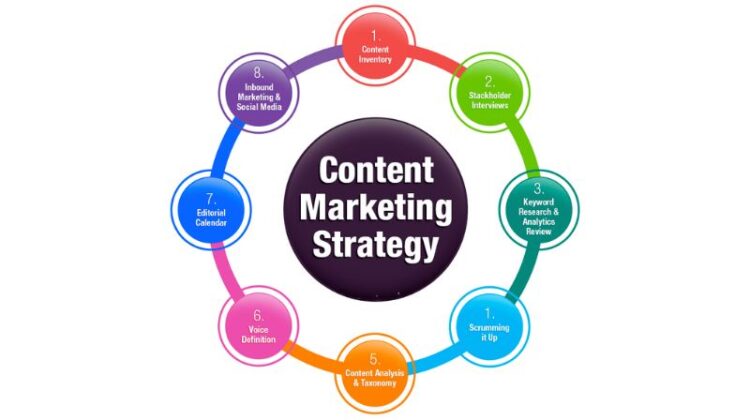
Content marketing is essential for small businesses aiming to establish a strong online presence and attract a targeted audience. With the right strategies, you can build brand awareness, drive traffic, and convert leads into loyal customers. In this article, we’ll explore ten proven content marketing strategies specifically tailored for small businesses. Whether you’re just starting out or looking to refine your existing content plan, these tips will help you achieve your goals.
1. Develop a Content Marketing Plan
Before diving into content creation, it’s crucial to have a well-thought-out plan. Outline your business objectives, identify your target audience, and decide on the types of content you’ll produce. A clear content strategy will keep your efforts focused and aligned with your business goals.
2. Leverage Blogging
Blogging remains one of the most effective content marketing strategies for small businesses. By consistently publishing valuable and relevant content, you can improve your search engine ranking and establish your brand as an industry authority. Focus on topics that address the pain points of your audience and offer actionable insights.
3. Utilize Social Media
Social media platforms are powerful tools for content distribution and audience engagement. Identify the platforms where your audience is most active, and tailor your content accordingly. Share blog posts, infographics, videos, and other content that resonates with your followers. Engage with your audience by responding to comments and messages promptly.
4. Create High-Quality Visual Content
Visual content, such as images, infographics, and videos, can significantly boost your content marketing efforts. People are naturally drawn to visuals, making it easier to capture attention and convey complex information quickly. Invest in professional design and video production to ensure your visual content stands out.
5. Optimize for SEO
Search engine optimization (SEO) is vital for driving organic traffic to your website. Ensure your content is optimized with relevant keywords, meta descriptions, and alt tags. Focus on creating high-quality, long-form content that answers your audience’s questions and provides value. Additionally, keep up with the latest SEO trends and algorithm updates to stay competitive.
6. Implement Email Marketing
Email marketing is an effective way to nurture leads and build relationships with your audience. Create a mailing list and send out regular newsletters with valuable content, exclusive offers, and updates. Personalize your emails to make them more engaging and relevant to your subscribers’ needs.
7. Repurpose Content
Repurposing content is a smart way to maximize your efforts and reach a broader audience. For example, you can turn a blog post into a video, podcast, or infographic. By presenting the same content in different formats, you can appeal to different segments of your audience and extend the lifespan of your content.
8. Collaborate with Influencers
Influencer marketing can be a game-changer for small businesses looking to expand their reach. Partner with influencers in your industry who have a strong following and can promote your content to their audience. This strategy can help you build credibility and attract new customers who trust the influencer’s recommendations.
9. Measure and Analyze Performance
To ensure your content marketing strategies are effective, regularly track and analyze your performance. Use tools like Google Analytics to monitor key metrics such as traffic, engagement, and conversion rates. By understanding what’s working and what’s not, you can make data-driven decisions to optimize your content marketing efforts.
10. Stay Consistent
Consistency is key to successful content marketing. Create a content calendar and stick to a regular publishing schedule. Whether it’s weekly blog posts, daily social media updates, or monthly newsletters, maintaining consistency will help you build a loyal audience and keep your brand top of mind.
FAQs
Q1. How often should I publish new content?
A1. It depends on your resources and audience. However, consistency is more important than frequency. Aim to publish new content at least once a week, but ensure it’s high quality and relevant to your audience.
Q2. What type of content works best for small businesses?
A2. The best type of content varies depending on your audience and goals. Blog posts, videos, infographics, and social media updates are all effective. Experiment with different formats to see what resonates most with your audience.
Q3. How can I improve my SEO?
A3. Improving your SEO involves optimizing your content with relevant keywords, creating high-quality backlinks, and ensuring your website is mobile-friendly and fast-loading. Regularly update your content to keep it fresh and valuable to readers.
Q4. Is email marketing still effective?
A4. Yes, email marketing remains one of the most effective content marketing strategies. It allows you to directly reach your audience with personalized messages, offers, and content, helping to nurture leads and drive conversions.
Conclusion
Content marketing is a powerful tool for small businesses to build brand awareness, engage with their audience, and drive sales. By implementing these ten proven strategies, you can create a successful content marketing plan that helps your business grow. Remember, the key to success lies in consistency, quality, and understanding your audience’s needs. Keep refining your strategies based on performance data, and you’ll see positive results over time.
By following these tips and regularly updating your approach, your small business can leverage content marketing to achieve sustainable growth.

